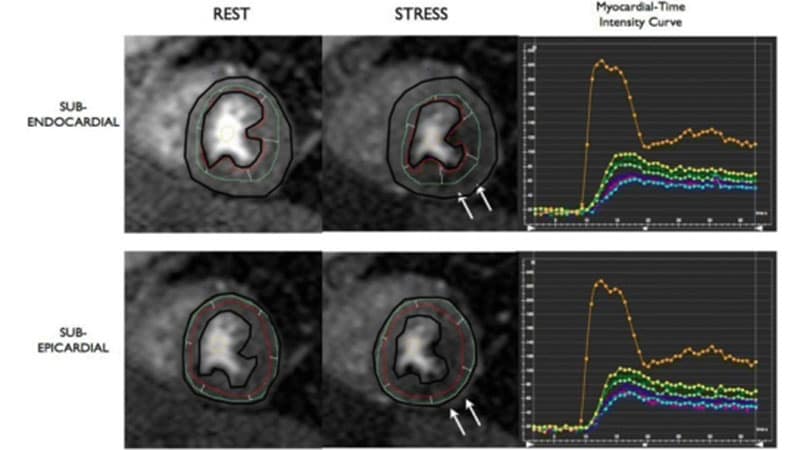TOPLINE:
A new review shows stress cardiovascular magnetic resonance (CMR) imaging provides high diagnostic accuracy and adds prognostic value vs other imaging modalities when assessing patients with chest pain.
METHODOLOGY:
-
The clinical utility of stress CMR in stable chest pain is still debated
-
Researchers analyzed 64 diagnostic and prognostic studies pooling 74,470 patients with chest pain, with mean follow up of 3.5 years
-
Eligible studies compared diagnostic accuracy of CMR vs invasive coronary angiography (ICA) or fractional flow reserve (FFR) as the reference test and/or reported raw data for all-cause death, cardiovascular (CV) death, and major adverse cardiovascular events, a composite of CV death and myocardial infarction
TAKEAWAY:
-
Stress CMR yielded high diagnostic accuracy and accurate risk stratification, particularly when 3-T imaging was used.
-
The presence of stress-inducible ischemia and late gadolinium enhancement was associated with higher mortality and likelihood of CV events
-
Normal stress CMR results were associated with a lower likelihood of CV events for at least 3½ years.
IN PRACTICE:
The authors conclude that the assessment of inducible myocardial ischemia and LGE by stress CMR can accurately diagnose and risk-stratify patients with stable chest pain and known or suspected coronary artery disease.
STUDY DETAILS:
The study was conducted by Fabrizio Ricci, MD, PhD, D’Annunzio University of Chieti-Pescara, Chieti, Italy, and colleagues. It was published online June 7 in JAMA Cardiology.
LIMITATIONS:
The review did not compare the yield of stress CMR with imaging modalities other than FFR and ICA. Results were derived mostly from observational studies over two decades, during which time there were several changes in the field.
DISCLOSURES:
The study was supported by the 2020 Search for Excellence Starting Grant, D’Annunzio University of Chieti-Pescara. Disclosures are available in the original article.
For more news, follow Medscape on Facebook, Twitter, Instagram, YouTube, and LinkedIn
Source: Read Full Article



